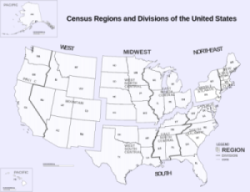
VIDEO: CREC Enhances Educators’ Understanding Using Public Data Tools
August 21, 2015The Center for Regional Economic Competitiveness (CREC) spent face time with South Carolina, Ohio, Texas, and Virginia community college administrators, showing them tools and techniques that assist them in better developing academic programs to serve current and future employer needs.
The training, led by CEO Ken Poole and Program Assistant Lindsay Johnson, is part of the organization’s partnership with the Multi-state Advanced Manufacturing Consortium (M-SAMC). The training took place at Spartanburg Community College in Spartanburg, S.C.
Established in 2012 under the TAACCCT Grant Program, the Multi-State Advanced Manufacturing Consortium (M-SAMC) is designing innovative program models to improve manufacturing education. With 13 college partners across 10 states, more than 40 industrial partners, and state-of-the-art technology, M-SAMC is leveraging CREC’s combined experiences to increase student success locally, and bring manufacturing jobs back to the U.S. nationally.
Videos Used in Trainings: Creating Job Titles
Dr. Poole specifically showed attendees how to find Standard Occupational Codes (shown below), which are helpful in determining employment data to determine job titles and ultimately wages. He and Ms. Johnson also demonstrated tools available from the Bureau of Labor Statistics and the U.S. Census Bureau.
Learn More About Using Job Codes
There are a myriad number of titles describing any one specific job. In many instances, multiple job titles can be used to describe a job with a common set of tasks. In order for Labor Market Information providers to collect wage and employment information about jobs in a standardized and consistent manner, they must classify jobs as occupations. This classification system is known as the Standard Occupational Classification (SOC). Therefore before accessing wage and employment data, researchers have to convert job titles to SOC codes. Data users can use the O*Net‐SOC Autocoder to find the right SOC code to match the job title in which they are interested.
1.Go to the O*Net‐SOC Autocoder: http://onetsocautocoder.com/plus/onetmatch
Type a job title into the Job Title search box.
- As an example, we will use “Welder” and then click on search.
- A box will appear on the right, make sure to select the tab at the top of that box thatsays SOC 2010.
- You will see that SOC 51‐4121 “Welders, Cutters, Solderers, and Brazers” is theoccupation with the best fit.
- You can now use this SOC Code provides the best occupations for which to findemployment and wage data about welders.
You can also use key terms from a job description to use find the right occupation to use.
- As an example, type “CNC Machine,” “Robotics,” and “Metal” into the Job Description Search Box and then type search.
- Again, make sure you are looking at the results under the “SOC 2010” tab on the right.
- You will see that SOC 51‐4011 “Computer‐Controlled Machine Tool Operators, Metaland Plastic” is the occupation with the best fit.
About CREC:
The Center for Regional Economic Competitiveness (CREC) is an independent nonprofit that provides strategic economic analysis and manages networks of data and research professionals. Our technical assistance expertise produces innovative, regional job-creating strategies. CREC achieves its mission by undertaking efforts to
- Understand the economic forces impacting regions and localities
- Assist local leaders in formulating knowledge-based strategies
- Develop transformational models that support knowledge-driven economic prosperity
CREC believes that institutions responsible for developing regional economies can be more effective in their efforts to create jobs for the knowledge economy. The Center helps these organizations achieve their goals by providing better information about regional economies and a framework for developing local consensus on strategic direction. CREC divides its work into five areas of expertise:
